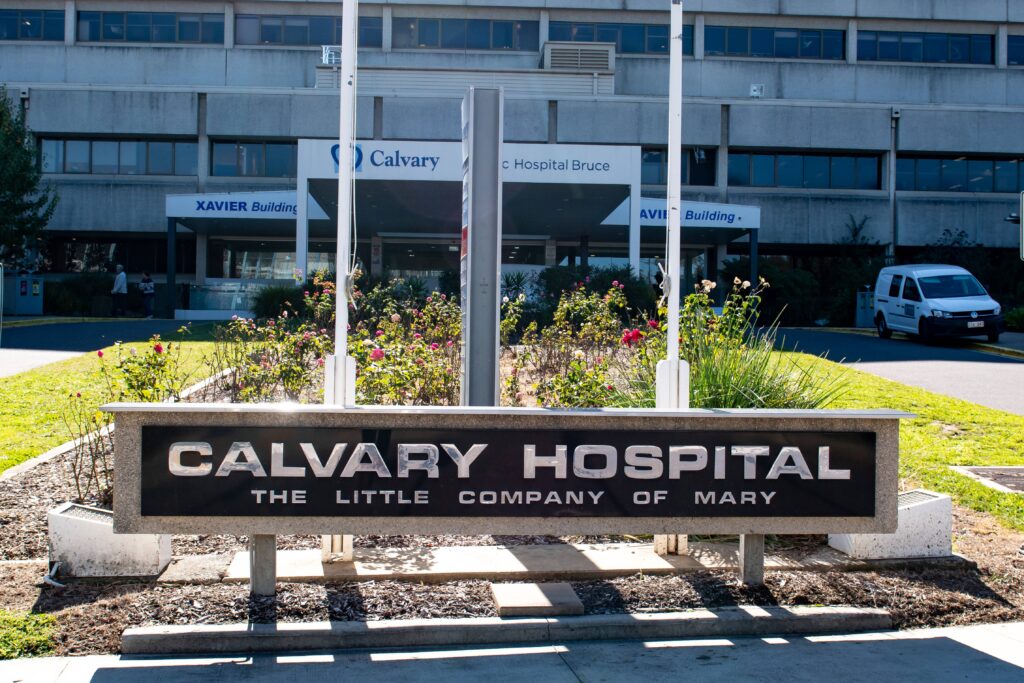The ACT government insists that their recent move to take over Calvary Public Hospital Bruce is about efficiency and not religion.
Maybe so. But as bumbling lawyer Dennis Denuto put it in The Castle, in relation to a different case of compulsory acquisition: “It’s the vibe.”
Several factors have fed public scepticism about the decision. For one thing, the announcement comes just weeks after a government report on Abortion and Reproductive Choice in the ACT misrepresented the services offered by Calvary and characterised the hospital’s “overriding religious ethos” as “problematic”.
That timing hasn’t helped; nor has the ACT president of the Australian Medical Association, Walter Abhayeratna, being quoted on ABC Radio in support of the move by underlining the importance of delivering public healthcare services “without being bound by ideology”.

Such instances of apparently saying the quiet part out loud have placed the dispute squarely within the frame of other, ongoing clashes over faith-based organisations and their contribution to the public good – such as the issue of non-discrimination in Christian schools.
It’s worth remembering how we got here. It was after World War II that Western governments began to take more systematic responsibility for social welfare, including healthcare. Rabbi Jonathan Sacks called it the “nationalisation of compassion”.
While the UK went down the route of building out a comprehensive National Health Service, in Australia, government decided to pursue the same goal partly by helping to fund existing services – poverty relief, aged care, hospitals, etc, which had overwhelmingly been provided by Christian charities since colonisation – rather than reinventing the wheel.
Hence the tapestry of hospitals, services, and institutions – both public and private, all playing important roles – that make up our healthcare system today. There’s something characteristically Australian about it: pragmatic, inclusive – and also, slow to change.
It’s understandable that the public has mixed feelings about faith-based service provision. Catholic hospitals account for around 10 per cent of the national total, and their stance on the beginning and end of life is increasingly out of step with large swathes of the community.
Governments have concerns about what faith-based providers won’t do. What about what they do do?
Calvary doesn’t perform elective abortions (although nor, apparently, does Canberra Hospital). It doesn’t support a bill for voluntary assisted dying that is due to come before the Legislative Assembly later this year. Some patients and healthcare workers will find these positions make them feel safer; others will feel let down.
Governments have concerns about what faith-based providers won’t do. What about what they do do? The “problematic” side of such provision is well-canvassed; what about its strengths?
Qtopia, Sydney’s brand new Queer museum which opened during WorldPride 2023, was established to honour those impacted by HIV/AIDS – and those who cared for them. It includes a reproduction of a room in Ward 17 South, the first dedicated HIV/AIDS unit in Australia, at St Vincent’s Hospital in Sydney. “The loving care shown in this ward was outstanding”, reads the museum website.
The terrible fear and stigma attached to the AIDS epidemic in the 1980s did not deter the Sisters of Charity, who insisted on non-judgmental care for the sufferers and themselves faced discrimination from the community – and the church – for their work. David Polson, one of the first men to be diagnosed with HIV/AIDS in Australia, has said that the Sisters “truly made it a haven” and “set a very powerful example for the rest of the health system”.
As one Sister of Charity has written about that time, “we are dedicated to the service of the poor – and poor does not mean without money, it means in need. God made us all and God doesn’t discriminate.” Being out of step with public sentiment can be a strength as much as a liability.
The Sisters of the Little Company of Mary, the religious order that in 1885 founded what is today Calvary Health Care, are named for Mary, the mother of Jesus, and the small group (“little company”) who stood at the foot of the cross as he died in agony. Their ethos insists on being present in love to the marginalised, suffering, and dying, being willing to go where so few of us outside the hospital system are these days.
The “ideology” that seems to perturb government administrators today – leading faith-based health services to resist the premises of abortion and euthanasia – is inseparable from this commitment to life on the edges. The clash of values that arises from some of the most fraught and deeply personal decisions anyone can make in their lifetime is one we would do well to navigate carefully and creatively.
Australia’s healthcare system is imperfect in many ways. It’s also one of the best in the world. Are we capable of successfully holding in tension conflicting demands and convictions, as we have done for many decades now?
What’s happening at and to Calvary Hospital, and its relationship to the rest of the ACT’s less-than-adequate hospital system, is no doubt complex and many-sided. But if this takeover does go ahead, religion shouldn’t be the reason.
Dr Natasha Moore is a Senior Research Fellow at the Centre for Public Christianity.
This article first appeared in The Canberra Times.


